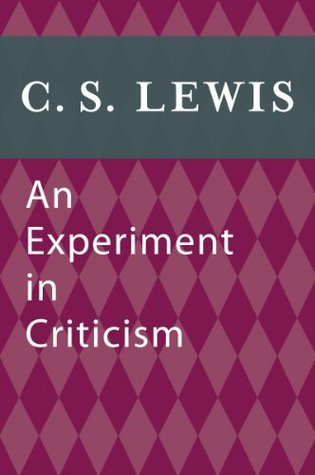More on this book
Community
Kindle Notes & Highlights
The distinction can hardly be better expressed than by saying that the many use art and the few receive it.
In a word, the behaviour of the myth-lover is extra-literary, while theirs is unliterary. He gets out of myths what myths have to give.
The strange events are not clothed with hypothetical probability in order to increase our knowledge of real life by showing how it would react to this improbable test. It is the other way round. The hypothetical probability is brought in to make the strange events more fully imaginable.
To be sure, no novel will deceive the best type of reader. He never mistakes art either for life or for philosophy. He can enter, while he reads, into each author’s point of view without either accepting or rejecting it, suspending when necessary his disbelief and (what is harder) his belief.
The dates at which our various traits develop are not a gauge of their value.
Who in his ordinary senses would try to decide between the claims of materialism and theism by reading Lucretius and Dante? But who in his literary senses would not delightedly learn from them a great deal about what it is like to be a materialist or a theist?
We start from the assumption that whatever has been found good by those who really and truly read probably is good. All probability is against those who attack.
We can find a book bad only by reading it as if it might, after all, be very good. We must empty our minds and lay ourselves open. There is no work in which holes can’t be picked; no work that can succeed without a preliminary act of good will on the part of the reader.
the question ‘What is the good of reading what anyone writes?’ is very like the question ‘What is the good of listening to what anyone says?’
The primary impulse of each is to maintain and aggrandise himself. The secondary impulse is to go out of the self, to correct its provincialism and heal its loneliness. In love, in virtue, in the pursuit of knowledge, and in the reception of the arts, we are doing this.
Those of us who have been true readers all our life seldom fully realise the enormous extension of our being which we owe to authors. We realise it best when we talk with an unliterary friend. He may be full of goodness and good sense but he inhabits a tiny world. In it, we should be suffocated.


